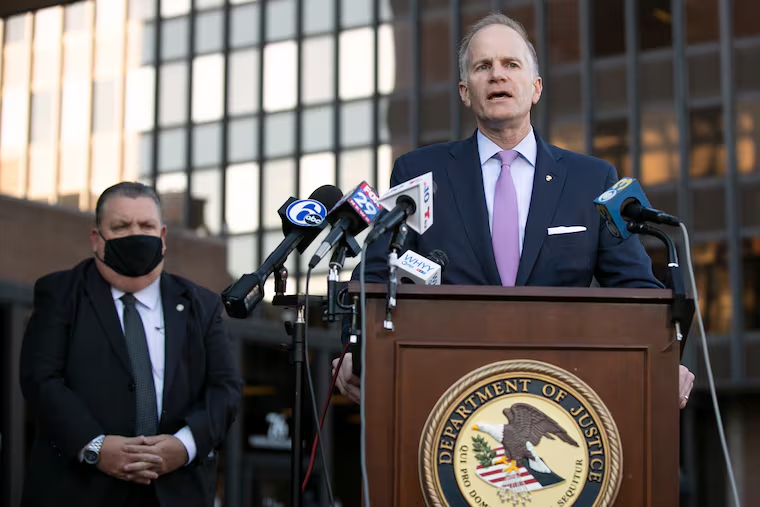Death penalty a possibility in new federal case against accused killer of Philly Police Cpl. James O’Connor IV
The indictment lays the groundwork for a possible capital case in the killing of Cpl. James O’Connor IV. Prosecutors say they’ve not yet decided whether to pursue a death sentence.

U.S. Attorney William M. McSwain announced federal charges Thursday against four men already incarcerated for the March shooting death of Philadelphia Police Cpl. James O’Connor IV, including counts that could leave one of them open to a federal death sentence.
And in a striking recrimination from a federal prosecutor, McSwain accused his frequent foil, Philadelphia District Attorney Larry Krasner, of implementing policies that were “every bit as responsible” for O’Connor’s slaying as the defendants themselves.
The case unsealed Thursday against Hassan Elliott, 22, Bilal Mitchell, 20, Khalif Sears, 19, and Sherman Easterling, 25, is not the first time McSwain — an appointee of President Donald Trump who is expected to leave his post with the change of administration — has charged defendants in cases where he has been dissatisfied with Krasner’s handling of their prosecutions.
But his remarks Thursday and the blame he placed directly on Krasner for O’Connor’s death further underscored his previous complaints about policies McSwain blames for the rise of violent crime in the city.
“Given these facts, it would be absurd, even grotesque, to leave it up to Krasner to direct the prosecution of …. O’Connor’s alleged killers,” he said at a news conference attended by O’Connor’s widow and more than 50 officers. “And it would be cruel to ask Sgt. O’Connor’s family to simply cross their fingers and hope Krasner’s pro-defendant agenda does not victimize them yet again. That absurdity ends today.”
Krasner’s office declined to comment on McSwain’s remarks. But spokesperson Jane Roh said the District Attorney’s Office would continue to pursue its own case against the men.
In a dig at McSwain, she added: “The Philadelphia District Attorney’s Office looks forward to working with the next U.S. Attorney … under President-elect Joe Biden as we seek to resolve in a timely manner these gravely serious cases.”
The federal charges, which also included various drug and firearms offenses, could significantly increase the potential punishment for Elliott, the accused triggerman behind O’Connor’s death.
The seven-count indictment included a special finding that lays the groundwork for prosecutors to prepare for it as a capital case, though McSwain said prosecutors have not yet decided whether to seek the death penalty should Elliott be convicted.
If they do, it will only be the third time since 2009 that federal prosecutors in Philadelphia have weighed a capital case. Previous defendants include Kaboni Savage, a notorious drug dealer on death row after ordering a firebombing that killed a witness and five others, and Linda Weston, a Tacony woman who avoided a capital trial but got a life sentence by pleading guilty to charges she enslaved and tortured disabled wards for years in her basement.
In each case that choice required special approval from the Justice Department in Washington, which, like the U.S. Attorney’s Office in Philadelphia, is likely to get new leadership when Biden takes office.
Elliott’s attorney, Walter C. Chisholm, said Thursday’s federal indictment caught him by surprise.
“It just seems like it’s overkill for the feds to come in despite what’s going on in the county” courts, he said. “I don’t see what that accomplishes.”
O’Connor was fatally shot on March 13 while attempting to arrest Elliott on a murder warrant for a 2019 slaying. His death further provoked the already strained relations between McSwain and the city’s police union on one side and Krasner on the other in a debate over violent crime and criminal justice policy in the city.
Within days of the officer’s slaying, the U.S. attorney publicly excoriated Krasner for not prosecuting Elliott more aggressively in a drug-possession case that was still open when he shot O’Connor through a closed door at a Frankford apartment building.
Krasner’s office had withdrawn the drug-possession charges after securing the warrant for the more serious murder charge that brought O’Connor to the building where he was attacked.
Elliott is already facing state charges connected to two other murders and a nonfatal shooting in addition to those stemming from O’Connor’s death.
Speaking at Thursday’s news conference outside the federal courthouse in Center City, the officer’s widow, Terri O’Connor, thanked McSwain’s office for taking on the case.
“These males should have never been out of jail,” she said. “This was a criminal organization, with plenty of prior arrests …. Maybe if they weren’t let out of jail, they wouldn’t have been holed up in a room with nine guns, waiting to prey on police or anyone else that came their way.”
According to the new indictment, Elliott and the three other men were long-standing members of a violent street gang known as “1700 Scattergood” that operated from a drug stash house on the 1600 block of Bridge Street.
From there, prosecutors say, they managed a cocaine and marijuana dealing operation and collected a cache of weapons, including the one allegedly used to shoot O’Connor.
At a court hearing in October, city prosecutors said Elliott had bragged of the shooting in jail and scrawled O’Connor’s name on the wall of his cell.
O’Connor, the son of a city police officer, was posthumously promoted to sergeant and, in addition to his wife, Terri, is survived by two children: Jimmy, also a city police officer, and Kelsey, who serves in the Air Force.